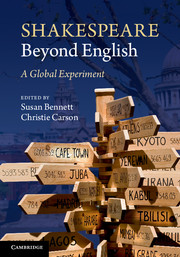Book contents
- Frontmatter
- Contents
- List of Illustrations
- List of colour plates
- Notes on contributors
- Foreword
- Acknowledgements
- Introduction
- The Globe to Globe Festival: An Introduction
- Performance Calendar
- Week One
- Week Two
- Week Three
- Week Four
- Week Five
- Week Six
- Chapter Thirty-Five Habima Merchant of Venice
- Chapter Thirty-Six Patriotism, Presentism and the Spanish Henry VIII
- Chapter Thirty-Seven Touch and Taboo in Roy-e-Sabs’ The Comedy of Errors
- Chapter Thirty-Eight Shakespeare and the Euro-crisis
- Chapter Thirty-Nine Restaging Reception
- Chapter Forty Reviving Hamlet? Nekrošius’ Lithuanian ‘Classic’
- Afterwords
- Index
- Plate section
Chapter Forty - Reviving Hamlet? Nekrošius’ Lithuanian ‘Classic’
Published online by Cambridge University Press: 05 June 2014
- Frontmatter
- Contents
- List of Illustrations
- List of colour plates
- Notes on contributors
- Foreword
- Acknowledgements
- Introduction
- The Globe to Globe Festival: An Introduction
- Performance Calendar
- Week One
- Week Two
- Week Three
- Week Four
- Week Five
- Week Six
- Chapter Thirty-Five Habima Merchant of Venice
- Chapter Thirty-Six Patriotism, Presentism and the Spanish Henry VIII
- Chapter Thirty-Seven Touch and Taboo in Roy-e-Sabs’ The Comedy of Errors
- Chapter Thirty-Eight Shakespeare and the Euro-crisis
- Chapter Thirty-Nine Restaging Reception
- Chapter Forty Reviving Hamlet? Nekrošius’ Lithuanian ‘Classic’
- Afterwords
- Index
- Plate section
Summary
Three days before I saw this Lithuanian production of Hamlet at the Globe to Globe Festival, I saw the Comedy of Errors from Afghanistan, which I thought was excellent, but I heard a woman in the audience say loudly to her companion, ‘Of course this isn't Shakespeare: they've turned it into a farce.’ Unfortunately, her words could have been applied, and more appropriately, to Hamlet. The publicity assured us that the director, Eimuntas Nekrošius, and the production were ‘legendary’ and that this Hamlet had toured the world to great acclaim since it was first performed in 1997, becoming ‘one of the most celebrated Shakespearean productions of our age’. It was, frankly, hard to see why, and I don't think it was just the cold, rainy circumstances of the Sunday evening performance.
In the world of opera we are accustomed in the UK to seeing revivals of very old productions with new casts, but not in the world of theatre. It seems, however, to have been common in the former Soviet Union and Eastern Europe to keep productions in the repertory for many years, and this is not always a bad thing. Yuri Lyubimov's Hamlet, for example, first performed at the Taganka Theatre in Moscow in 1971, was successfully revived at the Leicester Haymarket Theatre in 1989, and its politics still seemed relevant. Several of the productions in the Festival were ‘vintage’ productions of this kind, while others were newly commissioned. This gave London audiences the chance to see productions that have become ‘classics’ in their own countries, as well as to see how actors and directors are re-creating Shakespeare today. Experiencing the show with the diverse audiences has been one of the great pleasures of the Festival: even when the production has been less than brilliant, there has been a palpable sense of warmth and pride: ‘This is our language; these are our actors; this is our Shakespeare.’
- Type
- Chapter
- Information
- Shakespeare beyond EnglishA Global Experiment, pp. 298 - 300Publisher: Cambridge University PressPrint publication year: 2013

